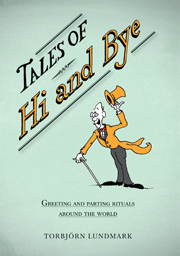Book contents
- Frontmatter
- Contents
- Acknowledgements
- To the reader
- Introduction
- Gestures & Signals
- Customs & Behaviours
- No hug for Dr Livingstone: a demonstration of restraint
- It hurts to say goodbye: the Parthian shot
- How stiff can your upper lip get? avoiding strangers
- Chinese whispers: greeting and parting rituals in China
- From Russia with love: sit on your case and say goodbye
- Cut it out! how to avoid saying ‘hello’
- I don't speak to my mother-in-law: avoidance language
- Phonethics: telephone mannerisms
- Thanks for having me on! names and forms of address in the media
- Eskimodesty: greeting and visiting in the Arctic
- Names & Addresses
- Postscript
- Notes
- Sources
- Index
I don't speak to my mother-in-law: avoidance language
from Customs & Behaviours
Published online by Cambridge University Press: 04 February 2010
- Frontmatter
- Contents
- Acknowledgements
- To the reader
- Introduction
- Gestures & Signals
- Customs & Behaviours
- No hug for Dr Livingstone: a demonstration of restraint
- It hurts to say goodbye: the Parthian shot
- How stiff can your upper lip get? avoiding strangers
- Chinese whispers: greeting and parting rituals in China
- From Russia with love: sit on your case and say goodbye
- Cut it out! how to avoid saying ‘hello’
- I don't speak to my mother-in-law: avoidance language
- Phonethics: telephone mannerisms
- Thanks for having me on! names and forms of address in the media
- Eskimodesty: greeting and visiting in the Arctic
- Names & Addresses
- Postscript
- Notes
- Sources
- Index
Summary
In many Australian Aboriginal cultures, as well as among some North American Indian and African Bantu peoples, human interaction and speech between certain relatives are taboo.
This usually means total avoidance of each other, but often also involves a special parallel language that is used if necessary, for instance if one member of the tribe is speaking and is aware that a ‘taboo’ person can hear what is being said.
These special languages are often known as ‘avoidance speech’ or ‘avoidance language’.
Because a very common taboo is the interaction between in-laws of opposite sex, the phenomenon is often called ‘mother-in-law speech’.
However, such taboos are not restricted to in-laws. For instance, a widespread no-no amongst Australian Aborigines is any kind of contact or interaction between brothers and sisters once they become adults.
The nature of the taboo varies, but often involves complete avoidance of the other person.
- Type
- Chapter
- Information
- Tales of Hi and ByeGreeting and Parting Rituals Around the World, pp. 120 - 123Publisher: Cambridge University PressPrint publication year: 2009

